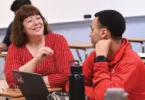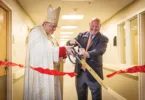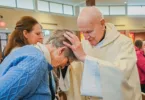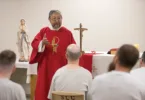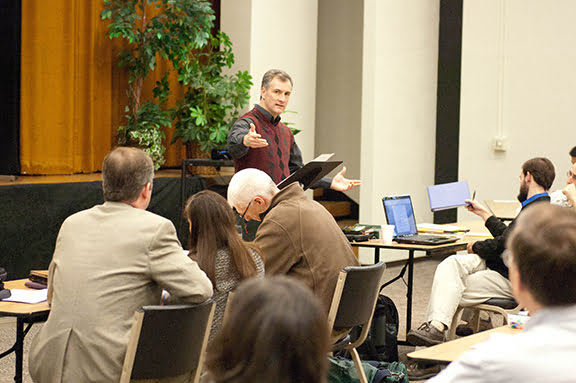
LEAVEN PHOTO BY JOE MCSORLEY Mike Scherschligt, executive director of the School of Faith, gives a presentation to the second cohort of deacon aspirants on Dec. 8 at Savior Pastoral Center, Kansas City, Kan.
by Joe Bollig
joe@theleaven.org
KANSAS CITY, Kan. — Investigating the permanent diaconate was not on Steve White’s short list — or the long one, for that matter. It wasn’t on any list at all.
But God, in his providence, gave White a new list through his spiritual director.
“I told her that I thought that God was calling me to do something more than what I’m doing — something different — [but] I don’t know what it is,” said White, a member of Curé of Ars Parish in Leawood.
She told him to write down anything — no matter how strange or unlikely — that he thought God might be asking him to do.
“The last thing I wrote down was the diaconate, because I wasn’t attracted to it, but I remembered Sister Julie Galen [at the parish] at one time asking if I’d ever thought about being a deacon,” said White. “Of course, I said no.”
He remembered that encounter, and put it on the list.
“No” led to “maybe.” “Maybe” led to “tell-me-more.” “Tell-me-more” led to conversations with his wife and others. The desire to further discern the diaconate grew.
Now, five years later, White is one of more than 90 men who applied and 22 who were accepted into the new cohort of the archdiocesan diaconate formation program.
This past September, the 22 men began a one-year program of intensive formation and discernment called aspirancy. It’s an opportunity for them to get a good look at the diaconate, and the archdiocese to get a good look at them.
If the aspirants decide to continue, they will become candidates and continue a three-and-a-half- year program of human, spiritual, theological and pastoral formation.
Those who complete the whole process and program will be ordained in spring 2017.
The aspirants of the second cohort (or group) for the permanent diaconate to be formed for the archdiocese are as different from each other as their individual calls. Most of them, however, are in their 40s or 50s, married, with children, heavily involved with their parish and other faith-related activities, and are lifelong Catholics.
Except for Steve Lemons, a member of Holy Trinity, Lenexa.
Lemons, 56, is married and has two daughters. In addition to his secular activities as a Lenexa city councilman, he is a lector, a eucharistic minister, a fourth-degree Knight of Columbus, a co-leader of marriage preparation classes with his wife Marilyn, and is a Catholic Community Hospice volunteer at Villa St. Francis in Olathe.
Lemons has also been director of administrative services at Good Shepherd Parish in Shawnee since 2008, after he retired from Farmers Insurance.
The difference is that Lemons is not a cradle Catholic. He was raised in the United Methodist Church and remained there for many years until he became a Catholic in 1994.
“I attribute that to the Holy Spirit saying, ‘Steve, it’s time for you to get more in line with your wife and daughters,’” said Lemons.
When he told his wife Marilyn, she told him that she’d been praying for it all along. She hadn’t told him earlier because she wanted the Holy Spirit to move him to that decision, not her.
Lemons, like White, was already involved but wanted to do more. No great flash from the heavens — but he felt a call.
“I wanted to share my faith with others, which we do through our daily lives, and I wanted to give back to the church,” he said. “I was at the point in my life that my kids were grown and that provided me with more of an opportunity to give to the church.”
“Working in the church as I do, I see that we have one priest at Good Shepherd who serves nearly 1,800 families,” Lemons continued.
“In many ways, a deacon could help him with his daily work and be an asset to the parish.”
He got a lot of inspiration from a quote from a vocations advertisement on the back of the Knights of Columbus magazine, Columbia.
It was this: God does not call the qualified; he qualifies the called.
This first year for the aspirants is like courtship, said Leon Suprenant, pastoral associate for administration for the office of the permanent diaconate.
Suprenant works under the direction of Father Gary Pennings, who is director of the archdiocesan office of the permanent diaconate. Two established deacons assist the program, Deacon Tom Mulvenon and Deacon Dan Peterson. Deacon Peterson was president of the National Association of Diaconate Directors and was director of the office of the diaconate for the Diocese of Phoenix.
“The initial year has a heavy emphasis on discernment,” said Suprenant, who himself is one of the aspirants. “In that regard, it is like the first year of being in a religious community or the first year of seminary.”
“This is a ‘come and see’ period,” he continued. “The guys have already gone through a fair amount of discernment and application before, but now they’re getting even more.”
Men must meet certain qualifications before they can apply. They may be single or in a stable marriage, practicing Catholics, and meet all the canonical requirements. They must have the “heart of a deacon,” which is a strong sense of service and charity.
“This isn’t an honorary title,” said Suprenant. “Deacons are called to be icons of Christ the servant.”
“We are looking for men who are already the salt of the earth and leaven in the church,” he continued, “and who with additional formation and the grace of the sacrament could take these gifts to another level of service in the church.”
The five years of formation and discernment include study, spiritual formation, prayer and service. The participants — and their wives — attend monthly weekend retreats and belong to “deacons’ circles” for study and mutual support.
“All aspirants have pastoral assignments,” said Suprenant. “They are required to do a minimum of 50 hours of service to their parish over the course of the aspirancy year. This gives them an opportunity to identify even more closely with the pastor and parish, and to ‘stretch’ them and introduce them to new areas of ministry.”
Second cohort of deacon aspirants
• Joe Allen, Prince of Peace Parish, Olathe
• Dave Cresswell, St. Patrick Parish, Kansas City, Kan.
• Mike Denning, Prince of Peace Parish
• Rolly Dessert, Immaculate Conception-St. Joseph Parish, Leavenworth
• Dean Gilbert, Immaculate Conception-St. Joseph Parish
• Steve Lemons, Holy Trinity Parish, Lenexa
• Brian Lillie, St. Ann Parish, Hiawatha
• Mike Moffitt, St. Paul Parish, Olathe
• Nicholas Mortagues, St. Bernard Parish, Wamego
• Marcos Navarro, Good Shepherd Parish, Shawnee
• Phillip Nguyen, Holy Spirit Parish, Overland Park
• Steve Nguyen, St. Ann Parish, Prairie Village
• Tim Ruoff, Mother Teresa of Calcutta Parish, Topeka
• Bill Scholl, St. Agnes Parish, Roeland Park
• Ralph Schramp, Church of the Nativity, Leawood
• Chris Slater, Prince of Peace Parish
• Brad Sloan, Mother Teresa of Calcutta Parish
• John Stanley, Church of the Ascension, Overland Park
• Leon Suprenant, Prince of Peace Parish
• Jose Torres, All Saints Parish, Kansas City, Kan.
• Steve White, Curé of Ars Parish, Leawood
• Ron Zishka, Sacred Heart Parish, Tonganoxie


